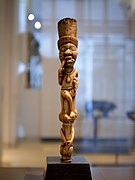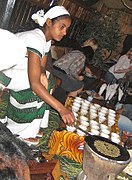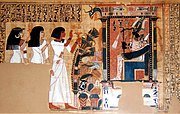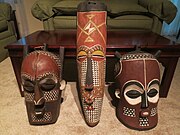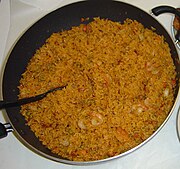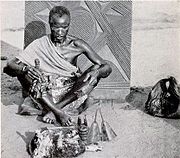IntroductionWelcome to the Pan-Africanism portal!
Bienvenue sur le portail panafricanisme!   Pan-Africanism is a worldwide movement that aims to encourage and strengthen bonds of solidarity between all indigenous peoples and diasporas of African ancestry. Based on a common goal dating back to the Atlantic slave trade, the movement extends beyond continental Africans with a substantial support base among the African diaspora in the Americas and Europe. Pan-Africanism can be said to have its origins in the struggles of the African people against enslavement and colonization and this struggle may be traced back to the first resistance on slave ships—rebellions and suicides—through the constant plantation and colonial uprisings and the "Back to Africa" movements of the 19th century. Based on the belief that unity is vital to economic, social, and political progress, it aims to "unify and uplift" people of African ancestry. (Full article...) Selected article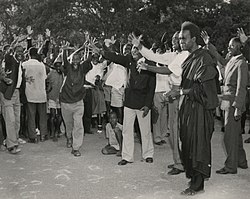 African nationalism is an umbrella term which refers to a group of political ideologies, mainly within Sub-Saharan Africa, which are based on the idea of national self-determination and the creation of nation states. Selected biography Aminata Mbengue Ndiaye is a Senegalese politician. In 2012, she was appointed Minister of Livestock and Animal Production in the Mbaye government. She also serves as mayor of Louga, and is currently chair of the women's movement of the Socialist Party of Senegal Selected history The First Pan-African Conference was held in London from 23 to 25 July 1900 (just prior to the Paris Exhibition of 1900 "in order to allow tourists of African descent to attend both events"). Organized primarily by the Trinidadian barrister Henry Sylvester Williams, it took place in Westminster Town Hall (now Caxton Hall) and was attended by 37 delegates and about 10 other participants and observers from Africa, the West Indies, the US and the UK, including Samuel Coleridge Taylor (the youngest delegate), John Alcindor, Dadabhai Naoroji, John Archer, Henry Francis Downing, and W. E. B. Du Bois, with Bishop Alexander Walters of the AME Zion Church taking the chair. Du Bois played a leading role, drafting a letter ("Address to the Nations of the World") to European leaders appealing to them to struggle against racism, to grant colonies in Africa and the West Indies the right to self-government and demanding political and other rights for African Americans. Selected cultureThe culture of Africa is varied and manifold, consisting of a mixture of countries with various tribes that each have their own unique characteristic from the continent of Africa. It is a product of the diverse populations that today inhabit the continent of Africa and the African Diaspora. African culture is expressed in its arts and crafts, folklore and religion, clothing, cuisine, music and languages. Expressions of culture are abundant within Africa, with large amounts of cultural diversity being found not only across different countries but also within single countries. Even though African cultures are widely diverse, it is also, when closely studied, seen to have many similarities. For example, the morals they uphold, their love and respect for their culture as well as the strong respect they hold for the aged and the important i.e. Kings and Chiefs. Africa has influenced and been influenced by other continents. This can be portrayed in the willingness to adapt to the ever-changing modern world rather than staying rooted to their static culture. The Westernized few, persuaded by European culture and Christianity, first denied African traditional culture, but with the increase of African nationalism, a cultural recovery occurred. The governments of most African nations encourage national dance and music groups, museums, and to a lower degree, artists and writers. Selection of images depicting African culture
Selected imagesOrganisationsAll-African People's Revolutionary Party · African Society for Cultural Relations with Independent Africa · African Unification Front · African Union · African Queens and Women Cultural Leaders Network · Conseil de l'Entente · Convention People's Party · East African Community · Economic Freedom Fighters · Global Afrikan Congress · International African Service Bureau · International League for Darker People · Organisation of African Unity · Pan African Association · Pan-African Congress · Pan Africanist Congress of Azania · Rassemblement Démocratique Africain · Pan Africa Chemistry Network · Pan African Federation of Accountants · Pan-African Freedom Movement for East and Central Africa · Sahara and Sahel Observatory · UNIA-ACL · ZANU–PF
See also
& Festivals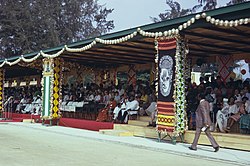 Photo by Helinä Rautavaara (1977) Publications
Films and TVAudios and videosDid you know ...that on arriving in Cuba in 1920, the SS Yarmouth (crew pictured), flagship of Marcus Garvey's Black Star Line, was hailed as the "Ark of the Covenant of the colored people"?
Selected quotesIn addressing imperialism at a Salisbury (Southern Rhodesia) meeting held on 9 April 1962, the former President of Zimbabwe Robert Mugabe delivered the following speech:
Pan-Africanism topicsCategoriesThings you can do
Related portalsAssociated WikimediaThe following Wikimedia Foundation sister projects provide more on this subject:
Discover Wikipedia using portals | |||||||


